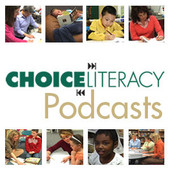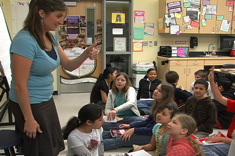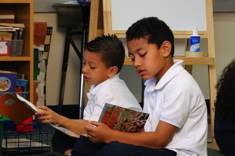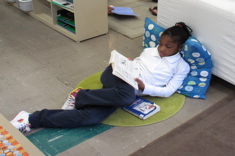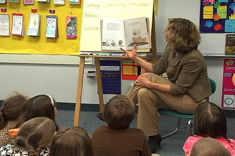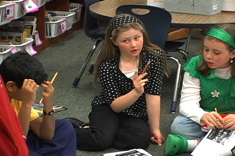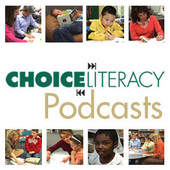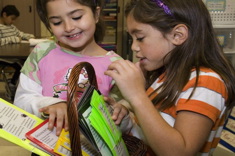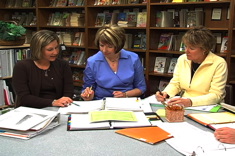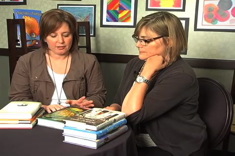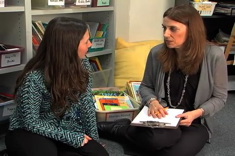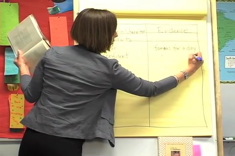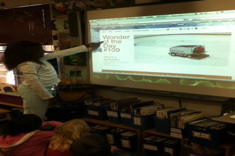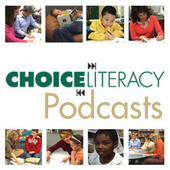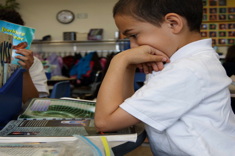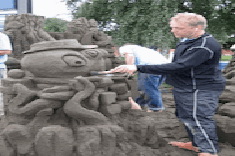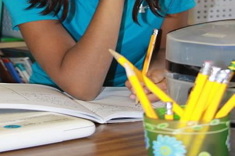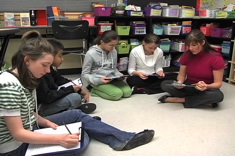Articles
Here is where you’ll find all the latest print features from our contributors. If you’d like to browse specifically by grade level, topic, or contributor, you can use the links in the right sidebar.
Latest Content
Writing Triage: Dealing with Dialogue Disasters
Is there a dialogue doctor in the house? If your students’ writing is filled with dull exchanges, you’ll enjoy these lesson suggestions from Heather Rader.
Catching Struggling Readers Before They Fall with Pat Johnson and Katie Keier (PODCAST)
Pat Johnson and Katie Keier share their thoughts on how a comprehensive literacy approach best meets the needs of all learners, especially those students who struggle.
Tech Tools for Our Youngest Learners with Kathy Cassidy (PODCAST)
Kathy Cassidy has the tips and tools of the trade for increasing technology in developmentally appropriate way for little ones.
The Triple Threat: Building a Community, Discussion Skills, and Writing Stamina
Katie Doherty knows how to pick the right text to move from whole-class conversations to writing.
Writers, Choice and Independence (Part I)
What does true independence look like among young readers and writers? A chance comment from a visitor to Aimee Buckner's classroom gets her pondering the amount of choice children have during units of study.
Sense of Little Engines
Heather Rader writes about "agency" – the challenge of letting students and teachers take charge of their learning. In concrete examples from a third-grade classroom and a professional development scoring session with teachers, Heather shares the subtleties of learning to trust, wait, and celebrate when learners of any age are responsible and independent.
Poetry Possibilities
Shari Frost shares literacy activity suggestions and a booklist of her favorite poetry anthologies.
Raising Readers: Independent Reading, Choices, and Intentional Reading Practices
How can teachers promote good independent reading choices for English language learners? Stella Villalba has suggestions.
Fireflies: Then and Now
Andrea Smith watches her young daughter capture fireflies in the twilight of a summer night. The evening reminds her of what’s changed in connecting literacy and life experiences, and what endures for teachers and kids.
Motive, Means, and Opportunity
When educators have literacy-rich environments at home, it is important to consider students' daily access to reading materials. Ellie Gilbert uses motive, means and opportunity to think about our literacy landscapes.
Favorite Short Mentor Texts for Demonstration Lessons
For teacher leaders who are called upon to do demonstration lessons, here is a “must-have” list of short, potent books.
Virtually Coaching a Lesson
Coaching cycles look different depending on teachers' needs. Via email and phone, Heather Rader has professional conversations with a teacher as he plans and designs a lesson for observation.
A More Literate Show and Tell
Tammy Mulligan and Clare Landrigan work with a kindergarten teacher to integrate literacy skill development into this favorite routine of young children.
Sharon Taberski on Comprehension Instruction (PODCAST)
In this podcast, Sharon Taberski chats with Franki Sibberson about comprehension instruction across the grades.
Books that Invite Students into Poetry Writing
Are your students stuck on writing poems that rhyme? Franki Sibberson shares some of her favorite mentor texts for lifting the quality of student poems.
Tips from Literacy Leaders for Closing Out the School Year (ROUND-UP)
Here are some suggestions from Choice Literacy Contributors of the best ways to close out the year, with everything from personal organizing tips to family events.
Best Practices All Day Long: Balancing Personal and Professional Success
If you’ve ever experienced that disequilibrium of feeling completely organized in your professional life, and hopelessly scattered during your personal time, you’ll enjoy Melanie Quinn’s reflective essay.
Transitioning to Guide on the Side: Facilitating Collaborative Scoring
Heather Rader wants to transition to more of a guide-on-the-side role as she coaches colleagues. Here are some simple strategies she uses to move offstage during collaborative scoring workshops.
A Closer Look at Anchor Charts
Shari Frost has a gift for helping us think about purpose and this article is no exception as she turns her attention to the benefits of intentional anchor charts.
Wonderopolis: Nonfiction, Technology, and Web-Based Independent Learning
Wonderopolis hits the sweet spot so many of us are looking for in web resources for students, delivering free, engaging, high-quality nonfiction text and video in small chunks that can easily be integrated into literacy and science workshops. Andrea Smith explains how she uses Wonderopolis daily with her students.
Patrick Allen on Conferring (PODCAST)
Patrick Allen talks about the value of conferring, and what he does to build his conferring skills.
Spring Slump
Audrey Alexander takes a close look at a couple of the students in her self-contained resource room, and finds the observations renew her flagging energy.
Off the Beaten Professional Development Path: What I Learned from the Teachers as Writers Group
Teacher writing groups are a wonderful informal way for teachers to get together over the summer voluntarily. Heather Rader has format suggestions, as well as tips for helping your group run smoothly.
Nonfiction Favorites for Boys (BOOKLIST)
What boy can resist a book titled How They Croaked? If you're looking for some books to fascinate and delight the boys in your classroom, Tony Keefer has some terrific suggestions of recent nonfiction titles in this booklist.
The Power of Checklists in Primary Literacy Workshops
Knowing our most sophisticated professions use checklists to get it right, Clare Landrigan and Tammy Mulligan share and explain checklists that work well for students.
Lesson Structure: Building a Strong Foundation
Stepping back to think about the design of quality instruction is essential for any teacher. Heather Rader looks to brain research and tried-and-true practices to lay out lesson components.
Making Connections as a Reader and a Scientist
Heather Rader finds that reading is at the heart of scientists’ work.
Pencil Plans
The care and use of the lowly pencil in classrooms says a lot about what we value and our relationships with students.
Linking Reading, Writing, and Getting to Know You Activities During the First Week of Middle School
Want to get your middle school students’ attention on the first day of school? Read a book about how to ruin it for them.
Calendaring a Literacy Coach
The joy and challenge of literacy coaching is creating a good structure for the day. Heather Rader has suggestions for short- and long-term planning on the coaching calendar.
Browse Content By
Type
Category
- Assessment Tools
- Big Fresh Archives
- Booklists
- Choice Numeracy
- Classroom Design
- Common Core
- Community Building
- Conferring
- Content Literacy
- Digital Literacy
- English Language Learners
- Equity
- Family Relations
- Free Samples
- Guiding Groups
- Leadership
- Literacy Coaches
- Mentor Texts
- Minilessons
- New Teacher Mentors
- Podcasts
- Poetry
- Quote Collections
- Reading Strategies
- Self Care
- Struggling and Striving Learners
- Talking and Listening
- Teacher Study Groups
- Teaching Reading
- Teaching Writing
- Word Study and Vocabulary
Author
- Melissa Quimby
- Nawal Qarooni
- Gwen Blumberg
- Julie Cox
- The Lead Learners
- Hannah Tills
- Josie Stewart
- Ruth Metcalfe
- Mallory Messenger
- Becca Burk
- Jodie Bailey
- Vivian Chen
- Mary Brower
- Tiffany Abbott Fuller
- Stephanie Affinito
- Ruth Ayres
- Leigh Anne Eck
- Heather Fisher
- Shari Frost
- Julie Johnson
- Suzy Kaback
- Gigi McAllister
- Shirl McPhillips
- Melanie Meehan
- Cathy Mere
- Debbie Miller
- Tara Barnett and Kate Mills
- Tammy Mulligan
- Dana Murphy
- Bitsy Parks
- David Pittman
- Brenda Power
- Heather Rader
- Matt Renwick
- Mandy Robek
- Christy Rush-Levine
- Gretchen Schroeder
- Jen Schwanke
- Brian Sepe
- Katherine Sokolowski
- Stella Villalba
- Jennifer Vincent
Grade Level
Choice Literacy Membership
Articles
Get full access to all Choice Literacy article content
Videos
Get full access to all Choice Literacy video content
Courses
Access Choice Literacy course curriculum and training


